Clea Simon's Blog, page 22
April 15, 2020
#NoContact book tour with Tim O’Mara
Welcoming crime fiction master Tim O’Mara to the #NoContact Book Tour! Tim and I went to high school together, and after a lapse of decades reconnected through the mystery world, and I was thrilled to contribute to Tim’s anthology Down By the River (Down and Out), which benefited American Rivers In recent years, we’ve also made sure to share a drink at mystery cons, and I can’t wait till we can do that again. Writer’s Tears whiskey, TIm? First round is on me… In the meantime…
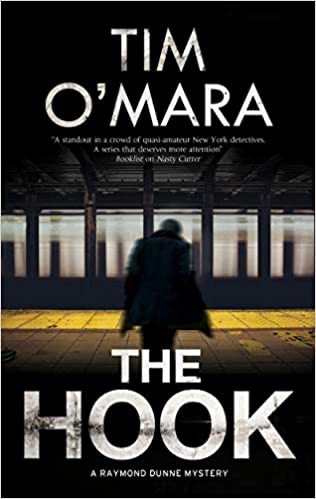
Tell us about your book!
The Hook is my fifth Raymond Donne—ex-NYPD cop turned schoolteacher—novel. This time around, a co-worker of Raymond’s—MoJo—is killed by an arrow on the roof of the school they work in. MoJo was working at Ray’s school as community service for drug possession and as part of his rehab. As Ray looks into the case—against the wishes of the cops—he discovers MoJo had some dealings a White Nationalist group. He also finds out that the rehab facility MoJo was attending may not be as clean as it looks.
What would you have been doing now to promote it? Where would you have been speaking? What bookstores would you have visited?
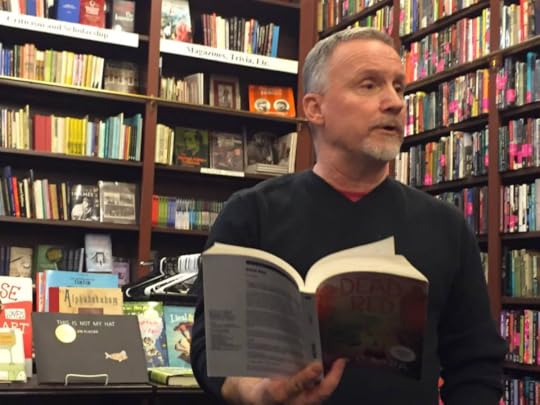
I was scheduled to do Book Culture on 112th here in Manhattan (www.bookculture.com) and of course, The Mysterious Bookshop (www.mysteriousbookshop.com) They’ve been cancelled and no future date has been set. I am doing readings in my living room, though, but have had to keep the crowds under 100.
Are you working on anything now? Is your process or routine different?
My process is a lot different right now. I’m doing a lot of dialogue with the idea of going back and filling in all that…non-dialogue stuff. I’ve actually been working on two new novels—neither one a Raymond—and a screenplay. And crossword puzzles. Lots and lots of crossword puzzles.
Do you think your writing will be changed by this crisis?
I’m not sure. I live in NYC and 9/11 did not change my writing as much as it changed my life and the definition of “impossible.” You can argue—because I know you and you’re from Long Island and love to argue—that changing my life does change my writing, so there’s that.
What’s the first thing you’re going to do when we’re free to be social again?I’m jonesing for some baseball at a bar, Clea. I’ve still been able to take long walks along the Hudson with my daughter so that’s good. But I really miss watching the Yanks on TV at my local joint. I even had tickets for the first Yanks/Red Sox game that I hope to use this year.
Maybe by the time this is over the Sox will have a decent team again…
April 14, 2020
#NoContact Pub Day with Sarah Smith
Today, let’s welcome Sarah Smith to the #NoContact Book Tour – and get ready to celebrate her new book, Crimes and Survivors. While we all stay inside and stay safe, books have become even more important – and with Sarah’s latest, we can actually set sail!
Hey, Sarah! Tell us about your book!
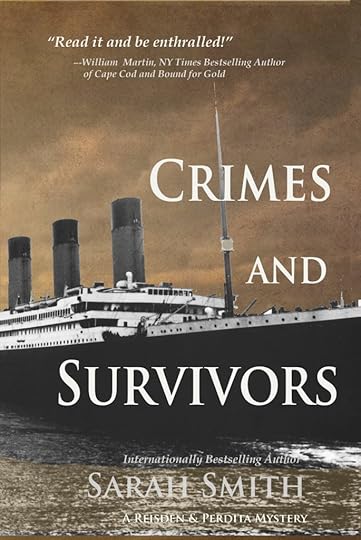
It’s about a woman who has to find out how she can survive.
It’s 1912. She’s a young pianist, just about to make her breakthrough, when she discovers that her grandfather, the grandfather she barely knows, may be passing for white.
This is the age of Jim Crow. She has a husband and a son. She has a mother, sisters and brothers, a big family. If it comes out, all their lives will be ruined.
She follows her grandfather onto the biggest, newest ship in the world to find out the truth—the right truth, the truth that will save her family.
But after the iceberg, she survives and he is in a coma. She survives, and somebody is willing to swear she’s safely white. But she’s devastated in a new way: she lived, but children the age of her own baby boy died on Titanic.
She has to start asking herself new questions about survival.
And what surprised me, because I obviously didn’t plan it, is how similar they are to what we’re feeling now. Many of us are fairly comfortable, able to do our work from home, with a place to go to and food in the house. We’re in lifeboats. But who has to stay aboard the deck of Titanic—who nurses the sick, stocks the grocery shelves, keeps the lifeboats afloat for us? Who dies so we can survive?
My heroine has survived.
Now what is she going to do about it? How will she, not only survive, but live?
Crimes and Survivors, out April 15.
What would you have been doing now to promote it? Where would you have been speaking? What bookstores would you have visited? (Feel free to add links!)
Bookstores, libraries, festivals…but I’d got a rather nice couple of linked events. I put together a Titanic exhibit—with a tiny piece of the actual Titanic!—and there was going to be a Titanic party at the library, sponsored by the library and the Brookline Booksmith. It was going to be fun.
It’s all gone online. And it’s still going to be fun. There’s a Titanic pot luck (BYO Titanic-themed munchies and drinks), a show-and-tell from Titanic collectors, and TWO costume contests, one for kids and one for adults. Find some dress-up clothes around the house, take a picture of yourself, and submit it here; you might win a prize!
And yes, if you’re there during the show-and-tell, you’ll see a tiny piece of the actual Titanic.
Details at https://tinyurl.com/TheLifeboatsParty If you sign up for free tickets, you get a downloadable goody bag.
There would have been signed books available….sigh. Instead, if you buy a book from any independent bookstore, you’ll get a handwritten Titanic postcard from me. Claim your postcard!
Are you working on anything now? Is your process or routine different?
I’m working on a completely different project, set in a fantasticated 19C Brazil that’s a lot like a place in Brazil I’ve visited and love. There are pirates and princes and poets, there are giant eagles who speak Latin, there’s revolution and love and a lot of sex. And there’s a plague, which was planned and being written long before Covid-19 hit. Not my favorite kind of research.
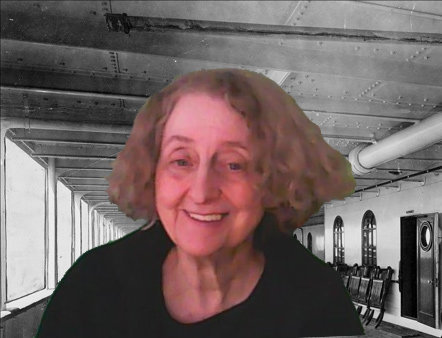
Do you think your writing will be changed by this crisis?
Short answer, oh gee yes.
Long answer, it was already changing because I’ve gone from traditional to independent publishing. There’s less of some kinds of recognition, but much more chance to connect directly with readers. I love that.
During the coronavirus I find it’s even more important for me to connect, to get the story out to anyone who might want it or need it. That’s my real job, to tell a story round the campfire and do my best to invite people who might need it to sit around the campfire too.
With the security of knowing that I can publish and get it to those readers, I find myself a more fearless writer.
Campfire call: If you need to hear about survival, and my book might help you, I want you to have that book. And that’s all that counts for me.
What’s the first thing you’re going to do when we’re free to be social again?
First I’m going to enjoy seeing my extended family—my son and his family, my brother and sister and their families, nieces and nephews and their kids.
And I’m going to keep in Zoom touch with the faraway friends I’m hanging out with now.
But—what a trivial person I am–I’m going to a flea market. Flea markets are magical; wonderful little chunks of history show up there.
Want to come with?
April 12, 2020
#NoContact Book Tour with Maddie Day (Edith Maxwell)
Welcome to the #NoContact Book Tour! While we all stay inside and stay safe, books have become even more important. But book events and conferences, alas, are canceled, which is why I am thrilled to welcome my sister New England cozy author Edith Maxwel, aka Maddie Day, here today! She brings with her an escape to a lovely summer spot … full of MURDER!
Thank you for inviting me over, Clea. Yes, many are the cancellations. Alas, but it’s necessary.
Tell us about your book!
Book two in the Cozy Capers Book Group Mysteries, Murder at the Taffy Shop, is set in August, full season on Cape Cod. When bike shop owner Mac Almeida heads out for an early walk with her friend, she finds a horrified Gin staring at an imperious summer person, dead on the sidewalk in front of Salty Taffy’s, Gin’s candy shop. When the police find the murder weapon in Gin’s garage, Mac and the Cozy Capers book group members put their heads together to clear Gin’s name and figure out who killed the woman whom almost everyone disliked. After the killer later invades Mac’s tiny house to finish her off, Belle, Mac’s African gray parrot, comes to the rescue. Murder at the Taffy Shopreleased March 31 in a one-year paperback exclusive from Barnes & Noble.
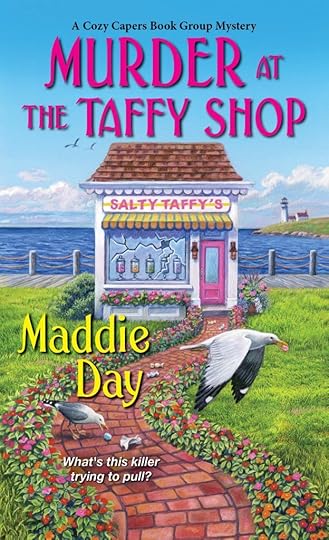
What would you have been doing now to promote it? Where would you have been speaking? What bookstores would you have visited?
Oh, my. So very many events cancelled. Here’s the April/May short list:
St. Joseph’s University in Philadelphia (a big-deal guest presentation to their writing program)Authors in April, Friends of Farmington, New HampshireFalmouth, MA Public LibraryWest Barnstable, MA Public LibraryHyannis, MA Barnes & Noble – where book one in the series sold so fast last year they had to keep reordering. Every author’s dream…Titcomb’s Bookshop, Sandwich, MAMalice Domestic – yeah, where my fourth historical mystery, CHARITY’S BURDER, is nominated for the series’ fourth Agatha Award for Best Historical Mystery. Deep sigh.Groveland Public LibraryMy local indy, Jabberwocky Books in Newburyport, MAPlus the Cape Cod Writers Conference, where I would have taught two courses in early August
I’m so sad about all of these.
Are you working on anything now? Is your process or routine different?
I’m writing NO GRATER CRIME, book nine in the Country Store Mysteries. Yes, graters are involved. My daily work routine isn’t really that different. I still go upstairs to my office and write away the morning. I still spend the afternoons (after walking, eating, and maybe some gardening) writing blog posts and catching up on the business of being an author. And trying to avoid my self-employed partner who is NOT working, instead sitting around reading and not doing any of the chores on that little list I left him.
Do you think your writing will be changed by this crisis?
Maybe. I wouldn’t be surprised if some darker themes emerged in my short fiction. But seriously? Everybody needs an escape from grim times. For me, writing is a respite from the scary, messy outside world. I still want to provide that respite for my readers, too.

What’s the first thing you’re going to do when we’re free to be social again?
I plan to go to Medford to squeeze my adorable toddler great-goddaughter and play, then drink wine with my best friend, the toddler’s Gran. I’ll have cocktails with my women friends, help my son and his wife move back to New England, attend Quaker Meeting for Worship in person instead of via Zoom, and shop and eat locally again. Okay, that’s seven-plus things, but I miss all of them.
Agatha and Macavity finalist Edith Maxwell writes the historical Quaker Midwife Mysteries and award-winning short crime fiction. As Maddie Day she pens the Country Store Mysteries and the Cozy Capers Book Group Mysteries. With twenty books in print and more underway, Maxwell lives north of Boston, where she writes, gardens, cooks, and wastes time on Facebook. She hopes you’ll find her on social media under both names.
April 8, 2020
#NoContact Book Tour with Gabriel Valjean
Today, let’s welcome Gabriel Valjean to the #NoContact Book Tour! Gabriel’s latest – Dirty Old Town – officially launched in late January, which feels like years ago now. And because Gabriel is such a constant supporter of our literary community, I’m so used to seeing him at book events all over town. But it looks like it’s going to be a little while before I can go to a real-life party for Gabriel. While we all stay inside and stay safe, books have become even more important. So let’s celebrate Gabriel and Dirty Old Town here today.
Tell us about your book!
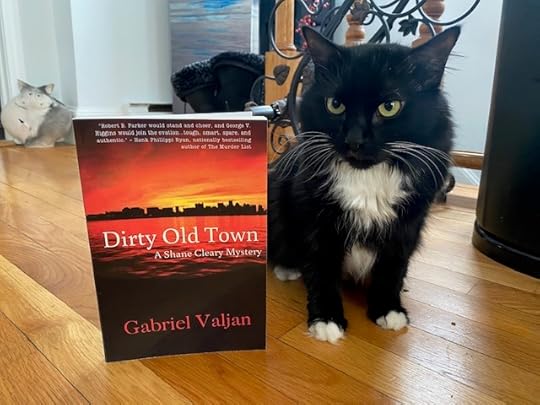
My most recent book is Dirty Old Town from Level Best Books (January 14, 2020). Shane Cleary is formerly of the Boston Police, now a private investigator. He’s broke and the client who approaches him was his first love. Her husband thinks he’s being blackmailed. Shane has mixed feelings about the case, but he needs the money, and he has that sense of dread common to noir, that this isn’t going to go as planned. And it doesn’t.
The novel is the first in the series and introduces readers to Boston’s South End during the 70s. I’m drawn to the era because it’s gritty, not politically correct by any stretch of the imagination, and many of the social issues of the day then are still with us today. Robert B. Parker and George V. Higgins covered the decade with style, but I’m not aware of anyone writing specifically about the South End. The neighborhood has a rich and notorious history, so I hope readers will join Shane on his cases.
What would you have been doing now to promote it? Where would you have been speaking? What bookstores would you have visited? (Feel free to add links!)
I have yet to get any of my books into stores, so I can’t say I had that a promotional tour in the works. I do have a virtual book blog tour with Partners In Crime. Level Best Books did reach out to local stores in Boston. I’m also hopeful that my nomination for an Agatha Award for Best Historical Mystery for my second in the Company Files series, The Naming Game, with Winter Goose Publishing will get me some traction.
The Shelter-in-Place has, as far as I can tell from social media, encouraged readers to shop online and support local bookstores. My hope is that both authors and local shops receive the love they deserve. If I had one thing to ask of readers, it is this: please write a review. PLEASE. A few words help authors and they do mean a lot, especially with all of us in isolation. I know many folks don’t think they can’t craft a review. It doesn’t have to be professional. A sentence or two is enough. It takes only a few minutes, and they mean so much to authors. Then, go and read your next book.
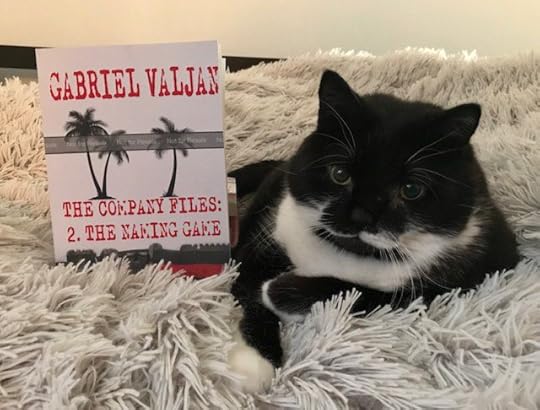
Are you working on anything now? Is your process or routine different?
I’m editing the second Shane novel, Symphony Road. The story takes its title from a Boston street, in a neighborhood that was notorious for suspicious fires. Arson was a prevalent crime throughout the 70s, in Boston and across the nation. Shane has a full plate in book 2, and he’s pulled in several direction at once.
My editing process hasn’t changed much over the years. I read my work as a stranger, or at least try. If something is unclear, I tag it and return to it. It’s not uncommon for me to do three or four passes before I send the manuscript over to my editor. The biggest change right now is that, while the project keeps me busy, I feel as if writing seems superfluous and indulgent when I read or hear the latest reports on Coronavirus. This is an ugly time, a painful time, of horrific tragedy that illustrates flaws and failures in our social infrastructure. In retrospect, when this is over, I think there will be a night of long knives, because so much of this could have been avoided.
Do you think your writing will be changed by this crisis?
I don’t think so, and I hope that doesn’t sound disrespectful. I’m a driven person and organized so I’ve always had an acute sense of how precious time is, and I seldom allow myself to become scattered and distracted. I set a goal and I do something every day until I get it accomplished. One step at a time.
What’s the first thing you’re going to do when we’re free to be social again?
This may sound simple and some people say I can do it now, but I would say take a long walk. At the moment, I’m indoors and avoiding contact with others as much as possible. It doesn’t bother me because I can go weeks without talking to another person. I should mention I was an only child, so solitude comes easily to me. As long as I can see the sky, I’m fine. What I miss is the sensation of the present moment, the breeze and the smells, the seeing and hearing people on the sidewalks, the dogs barking and playing with their friends. I suppose I’m low-maintenance.
I know what you mean, Gabriel. Just the sounds of normalcy will be so welcome. Be well!
Read an excerpt from Dirty Old Town here: https://wp.me/p1Ykp4-wt
Links:
Level Best Books: https://bit.ly/3dEw4V8
My Partners in Crime Tour: https://bit.ly/342MPoP
Dirty Old Town on Amazon: https://amzn.to/39Fypw5
Excerpt from Dirty Old Town: https://wp.me/p1Ykp4-wt
Naming Game on Amazon: https://amzn.to/39BgGFK
Excerpt from Naming Game: https://wp.me/p1Ykp4-pb
Winter Goose Publishing: http://wintergoosepublishing.com/
Agatha Award Nominees (all categories): http://malicedomestic.org/agathas.html
Social Media
Twitter: @GValjan
April 6, 2020
Remembering Kate Mattes
This ran in the Sunday Boston Globe on April 5. For the full obit, please see here.
APPRECIATION
Remembering Kate Mattes, a maven of mysteries
At Kate’s Mystery Books in Cambridge, Mattes nurtured the likes of Robert B. Parker, Linda Barnes, and Dennis Lehane, and launched my career, too.
By Clea Simon Globe Correspondent,Updated April 6, 2020
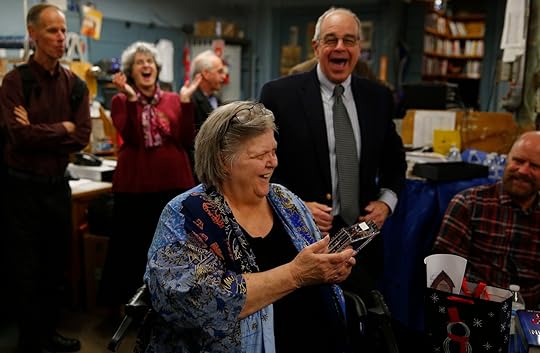 Kate Mattes received the 2016 Robert B. Parker Award at New England Mobile Book Fair in Newton in December of 2015. JESSICA RINALDI/GLOBE STAFF/THE BOSTON GLOBE
Kate Mattes received the 2016 Robert B. Parker Award at New England Mobile Book Fair in Newton in December of 2015. JESSICA RINALDI/GLOBE STAFF/THE BOSTON GLOBEKate Mattes knew how to throw a party. At the legendary holiday gatherings in her Cambridge store, Kate’s Mystery Books, famous names like Robert B. Parker or Linda Barnes would mingle with fledgling authors under shelves labeled “Strong Women Protagonists.” Readers who had come to meet a traditional mystery author like Jane Langton or Katherine Hall Page would find themselves elbow-to-elbow with a tough guy like Dennis Lehane, only to find the noir master as charming as the librarian waiting patiently to get by to the shrimp plate, all under the watchful gaze of dozens of black cat curios, and, of course, Kate herself.
Although Kate attempted to pace her gatherings, asking authors to come sign their books in shifts, a delightful chaos reigned. Despite the vagaries of New England Decembers, the crowd inevitably spilled out onto the lawn, carrying on the conversations among the fake gravestones that decorated the Victorian house’s front yard. Often, the crush was so tight that despite directions from Kate or one of her many volunteers — “Your books are over by New England Authors” or “under that cat clock” or “by the secret door” (a moveable bookcase opened onto a passage to a back storeroom/office) — signings during the event were aspirational. It didn’t matter; we were there to celebrate.Get HomeFront in your inboxThe Weekender is temporarily HomeFront, your guide to the best ways to stay entertained at home any day of the week.Sign Up
Writers are notorious introverts, and reading is essentially a private experience. But Kate — a large woman in every sense — created a community, supporting and nurturing crime fiction authors as well as fans. Often she helped turn one into the other. I first came to Kate’s as a reader, drawn not simply by her massive selection of cheap used books but also by her expertise. If Kate suggested I read someone I’d never heard of — Barbara Neely, for example — I would. I had a degree in literature when I first wandered into that crowded North Cambridge shop, but Kate educated me in crime fiction.
She also gave me my career. Although I read primarily fiction for fun, I’d been working as a journalist when my third nonfiction book, “The Feline Mystique: On the Mysterious Connection Between Women and Cats,” came out in 2002. Kate told me she’d order some, and I should come sign it at the next holiday party.
“But Kate,” I remember protesting. “It’s not a mystery.”
Kate, in my recollection, chuckled, and with that dry delivery so many of us can recall, squinted up at the black cat tchotchkes that filled every available space, and said, “Believe it or not, Clea, there’s a big crossover between women who love cats and mystery readers.”
I can’t remember if I sold any books that night, or even if I made it over to wherever the pile was. What I do remember was later, helping to clean up. As the last few folks around collected plastic wine glasses and swept crumbs off the stacks of books, Kate made a pronouncement. “Clea,” she told me. “You should write a mystery.”
I don’t know if that was a suggestion or a command — or if she’d finally given me permission to attempt something I’d secretly dreamed about — but the next day I started. When my “Mew is for Murder” came out in 2005, Kate hosted the party, as she did for several other of my books as well, before the store closed for good in 2009.
In the days since her death, I’ve been hearing similar stories from so many. Toni L.P. Kelner (who also writes as Leigh Perry), Leslie Wheeler, Kate Flora, and Hallie Ephron were among the local authors who launched their first mysteries with a Kate’s party. One of the founding mothers of Sisters in Crime — a now-global organization promoting women and other under-recognized writers — Kate also regularly hosted the local branch of the Mystery Writers of America as well. We all knew that the custom built-in shelves had been constructed by Parker, back when the carpentry work paid more than his writing, and we all trusted that in her sometimes scattered fashion, she’d find a way to read and comment, support and promote just about everything her people did.
When Kate closed her store in 2009, we lost that. She and I still met occasionally — Kate was fond of the burgers at R.F. O’Sullivan’s in Somerville — but after she moved to Vermont, where her sister lives, those lunches became less feasible, and we fell out of touch. When Tom Lyons, whose New England Mobile Book Fair took over the tradition of those holiday parties, reached out with the news of Kate’s death, it sparked a string of e-mails and social media posts, a necessarily virtual gathering of writers and readers and other longtime friends in the community and in the organizations she helped nourish. How like her, to bring us all together again to share memories and friendship and, maybe, start some new stories..
Clea Simon is the author of 26 mysteries, most recently “An Incantation of Cats,” and can be reached at www.cleasimon.com.
April 5, 2020
#NoContact Book Tour with Joanna Schaffhausen
Today we’re welcoming Joanna Schaffhausen to the #NoContact Book Tour! I was lucky enough to attend Joanna’s local launch event for All the Best Lies (see the evidence below!) before the world went sideways. She read and cracked jokes, while her wonderful daughter helped distribute the Winston-decorated cupcakes. Oh, how much fun – how normal! – that all was. Sadly, Joanna’s tour for the new Reed and Ellery has been canceled, But while we all stay inside and stay safe, books have become even more important, so please join me today on Joanna’s #NoContact book tour!
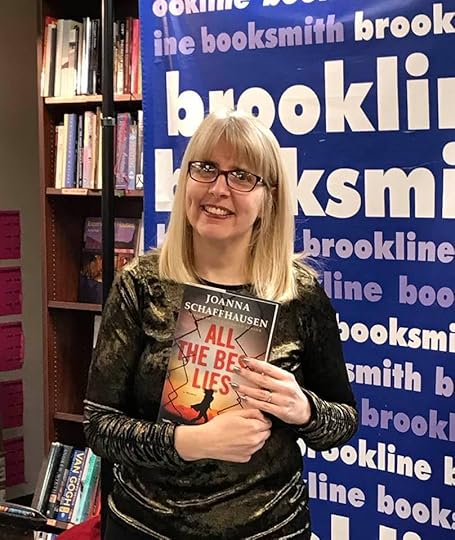
Tell us about your book!
All the Best Lies is the latest book in my Ellery Hathaway series. This time, Ellery is tagging along with FBI Agent Reed Markham as he investigates an intensely personal cold case: the brutal stabbing of his mother in Las Vegas more than forty years ago. Reed was a baby at the time, lying in his crib when his mother was murdered. He’s always wondered if he’d glimpsed the killer. When a DNA test reveals the shocking identity of Reed biological father, he heads to Vegas to unearth the truth about his origins. He and Ellery begin tracing his twisted family tree, knowing the path leads back to a vicious killer–one who’s been hiding in plain sight for forty years and isn’t about to give up now.
What would you have been doing now to promote it? Where would you have been speaking? What bookstores would you have visited?
I’ve been unable to visit so many of my favorite places. I’m especially sad that I was unable to attend the amazing Tucson Festival of Books because it would have been my first time visiting the city and the festival. I had events scheduled at Belmont Books, Odyssey Bookshop, and An Unlikely Story, three fabulous indie bookstores. I was supposed to be at a bunch of terrific libraries as well, including those in Duxbury, Milford and Waltham.
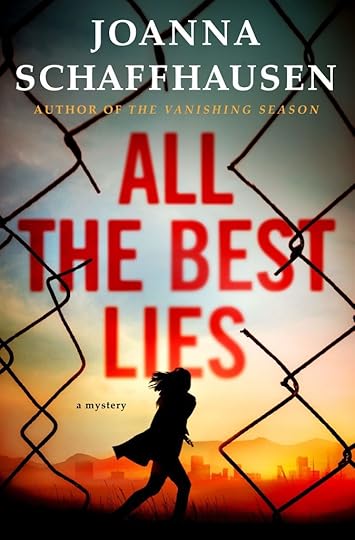
Are you working on anything now? Is your process or routine different?
I am being pressed into service as a fifth-grade teacher for my 10-year-old daughter. The puppy can’t go daycare, so he needs extra attention as well. In my spare minutes, I’m working on the copyedits for Reed and Ellery’s next adventure, Every Waking Hour.
Do you think your writing will be changed by this crisis?
I am sincerely hoping it just returns to normal.
What’s the first thing you’re going to do when we’re free to be social again?
Oh, gosh. Leave my house and not return for like three months, maybe. I can’t wait to see family and friends in person. I can’t wait to travel. I will never take a simple hug for granted again!
I know what you mean. I am going to every book event, every gig, every party … and hugging everyone! As soon as it’s safe. Thanks for coming over, virtually, Joanna!
April 2, 2020
Booking it with Catriona McPherson
Welcome to the #NoContact Book Tour! While we all stay inside and stay safe, books have become even more important. But book events and conferences, alas, are canceled. So let’s “meet” some authors here, shall we? To launch this series, I give you the great (and very, very funny) Catriona McPherson, whose got THREE books “on tour” right now.
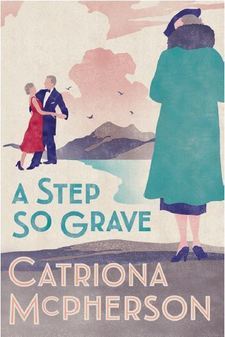
Tell us about your book!
I’m assuming the “or books” is silent? Great.
Well, STRANGERS AT THE GATE is my latest modern standalone psychological thriller domestic noir woman in peril novel (I use all the words so I know I’ve used the right ones (seriously what is this sub-genre actually called?)). It’s about a young married couple who witness a murder and find out that they’re not who they thought they were . . . they’re strangers. And they live in a gate lodge.
Also, there’s the second in a series about a Scottish fish out of water in California – SCOT AND SODA. All the characters I fell in love with in the first book are back, even largerer than life and just as potty-mouthed.
Finally, A STEP SO GRAVE is out in the US. It’s the . . . fourteenth, I think . . . in my historical series. I’m up to 1937 now. I enjoyed this one tremendously: it’s set in the lead up to a family wedding, so there are plenty other tensions besides the murder.
What would you have been doing now to promote it? Where would you have been speaking? What bookstores would you have visited? (Feel free to add links!)
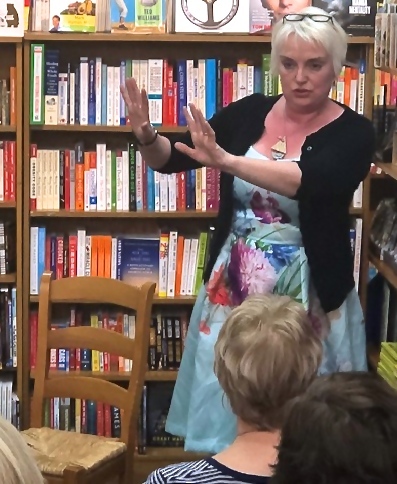
Ach. This was going to be a huge travel and appearance season. Left Coast Crime was shut down. As it turned out Scot and Soda won the Lefty award for best humorous mystery. They delivered it by courier and I did a photo-shoot in the garden wearing the dress I had been planning to wear to the awards dinner.
Right now, I was to have been in Florida at Sleuthfest, where Oline Cogdill was going to be doing my Guest of Honour interview.
And then there were the Edgars and Malice coming up at the end of April. Strangers at the Gate is up for the Mary Higgins Clark award. It is sad to think none of us are going to be there in poor New York and then getting the train down to Bethesda the next day.
May was full of bookshops and bookclubs and assorted fun.
But actually, I don’t have a new book out until later this year: THE TURNING TIDE. I hope that all will be settled into the new normal by then and I’ll be at the Avid, Reader, Davis. With cakes.
Are you working on anything now? Is your process or routine different?
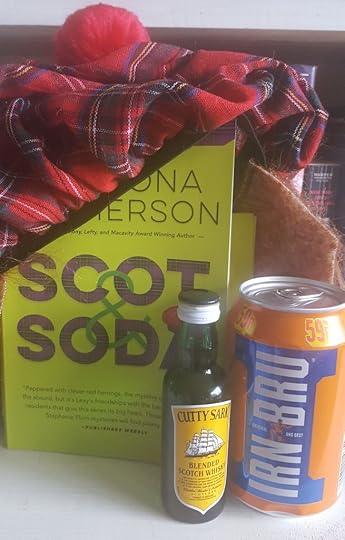
I am working pretty much as usual, yes. Except for my handy household scientist being right here, working too. Mostly on Zoom. He’s on Zoom now. I’m going to tune in to what he’s saying . . . “probably lined, but if you change it to a scattered plot that’ll fix it” . . . it’s like spa music. I don’t understand anything he says at a deep enough level for it to be intrusive.
Do you think your writing will be changed by this crisis?
Eek. It had better be a lot richer in theme, with cleaner prose, and delivered quicker, right? Because we’ve got nothing to distract us from it. Seriously, I am writing about an earlier time period right now and every passing mention of scarlet fever, diphtheria, TB, and smallpox is much more prominent than usual.
What’s the first thing you’re going to do when we’re free to be social again?
I’m going to hug someone. (I mean, someone I know, not just randomly run out and hug a stranger and get arrested for assault.) And then I’m going to get a latte. And go to the pictures. And eat a burrito. And sushi. Yep, I’m going to eat a sushi burrito in the cinema, one-handed, while hugging a friend and trying not spill my latte.
This too shall pass.
Thanks, Catriona. It shall!
March 26, 2020
Kate Mattes, R.I.P.
We have lost Kate Mattes, proprietor of the legendary Kate’s Mystery Books in Cambridge, co-founder (with Sara Paretsky) of Sisters in Crime, and all-around champions of writers, particularly women writers, and readers. Word is that she had a sudden cardiac event, following a period of declining health. More (including links to a full obit) as I get it.
Kate was the best. I owe her a special debt because she was the one who (after one of her legendary parties) told me, “You should write a mystery.” (Reader, I did.) Had lunch with her some time ago, after she closed her shop and retired to Vermont. Meant to keep in touch. Didn’t. Moral of the story: reach out to those who matter NOW. And, as Toni L.P. Kelner so wisely said, let’s raise a glass to Kate – and buy a book, ideally from an independent bookseller.
March 22, 2020
Five Questions with Michelle Cameron
Michelle Cameron and I met when I interviewed her years ago. She was helping me with one of my projects, but that chat introduced me to her own wonderful historical novels. Now I’m thrilled to introduce her – and her upcoming BEYOND THE GHETTO GATES – to you. Because in these strange times, what could be a better escape than to dive into a rich historical about a long ago time (the Napoleonic era) and a far away place (Ancona, Italy). Prepare to be transported…
How does a book start for you?
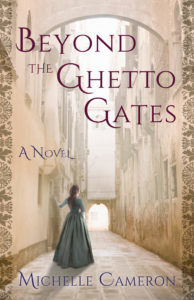
As a historical novelist, it always starts through reading. I’ll come across something in a book and recognize that it might make a wonderful novel. With Beyond the Ghetto Gates, I was reading Michael Goldfarb’s nonfiction book, Emancipation: How Liberating Europe’s Jews Led to Revolution and Renaissance, and was struck by his description of Napoleon’s encounter with the Jews and ghetto in Ancona, Italy. That was where everything began.
Who in your latest book has surprised you most – and why?
My main character, Mirelle. She started out as a passive, culturally appropriate 18th Century young lady – and ended up (after many revisions) as a much more feisty, assertive young woman. In addition, at first I made her artistic, but eventually realized that wouldn’t work for the plot. So she evolved, ending up with a managerial and quite pronounced mathematical bent. Since I myself am nearly always befuddled by numbers, that was a huge surprise. But at least I have a mathematically adept son that I could model her on.
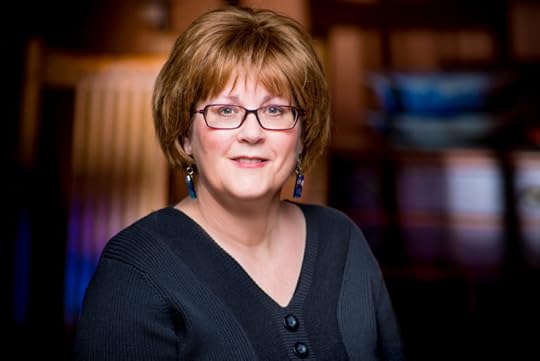
When and/or where is your latest book set and is there a story behind that setting?
As mentioned above, the novel is set primarily in the harbor city of Ancona, Italy, because that was the first Italian ghetto gate Napoleon tore down. Ancona was new to me, and my research into the city gave me two amazing gifts. The first is that Ancona was then the world center of ketubah (Jewish marriage certificate) creation – beautiful illuminated documents that were hugely sought after. The other was that, right before Napoleon and his forces arrived, a portrait of the Virgin Mary in the city’s cathedral was reported to move her head and cry. I read a compelling anecdote of how, when Napoleon saw the portrait, he turned white and threw a gold cloth over it. That was too good a story to pass up, so I expanded upon it – fictionally – as part of the plot.
What are you working on now?
The next book in the series, when Napoleon and his forces – including two of the characters who played major roles in Beyond the Ghetto Gates, will travel on a somewhat bizarre yet historically accurate expedition to Egypt and Israel.
Which question didn’t I ask you that I should have?
This novel, like your previous historical, The Fruit of Her Hands, are Jewish historical fiction. Why did you choose that as a genre?
I think it chose me, not the other way around. It did help that I spent most of my high school years in Israel, where my phenomenal Jewish history teacher gave me more depth and breadth of knowledge than most American Jews have. My first book – a verse novel on the fictionalized life and loves of William Shakespeare called In the Shadow of the Globe – aligned more closely with the type of history I thought I’d be writing about. But then I discovered the story of my 13th Century ancestor, Meir of Rothenberg, which plunged me into an era of medieval Jewish history that was largely unknown. Having written that, turning to this other unfamiliar point in Jewish history just felt natural.
MICHELLE CAMERON is a director of The Writers Circle, an NJ-based organization that offers creative writing programs to children, teens, and adults, and the author of works of historical fiction and poetry: Beyond the Ghetto Gates (She Writes Press, 2020), The Fruit of Her Hands: The Story of Shira of Ashkenaz (Pocket, 2009), and In the Shadow of the Globe (Lit Pot Press, 2003). She lived in Israel for fifteen years (including three weeks in a bomb shelter during the Yom Kippur War) and served as an officer in the Israeli army teaching air force cadets technical English. Michelle lives in New Jersey with her husband and has two grown sons of whom she is inordinately proud. Visit her website for more information https://michelle-cameron.com.
Advance praise for Beyond the Ghetto Gates:
“A gripping peek into a bygone Italy and an astute look at the era’s prejudice.” — Kirkus Review
“Beyond the Ghetto Gates is a timeless coming-of-age story.” — 4 Star Foreword Clarion Review
Now available for pre-order: IndieBound | Barnes & Noble | Amazon | Kindle | Books-A-Million | Book Depository | Google Play
March 15, 2020
Five Questions with Sarah Smith
Sarah Smith is a time traveler! Although we New Englanders know Sarah as an indefatigable supporter of the local crime fiction scene, to readers worldwide she is the Agatha Award-winning (and New York Times notable books) author of Chasing Shakespeares (yes, plural!), which was the first of Sarah’s books I read, as well as the Vanished Child (Alexander Reisden and Perdita Halley) series. In all these books, Sarah has a way of bringing the past alive – and letting us into some of its biggest mysteries. This month, Sarah dives deep to get into the Titanic and so much else that was going on in 1912 (Jim Crow, etc.) with a new Reisden/Halley book, Crimes and Survivors. And although her Titanic-themed party has been postponed thanks to the coronavirus, the virtual celebrations begin here. Strike up the band!
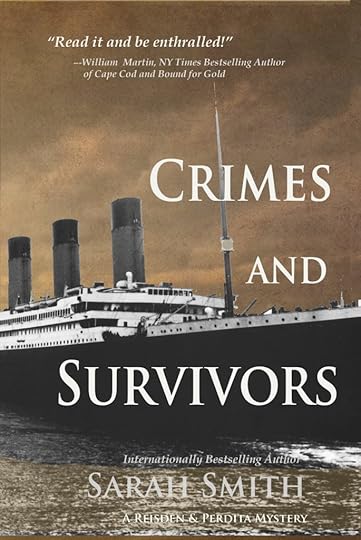
Thanks for coming here, Sarah. So tell me, how does a book start for you?
With a whole lot of little fragments that I throw in a bag and shake. Crimes and Survivors started with
A book about the Titanic, because TitanicAn idea about a woman who’d always thought she was white, but found out that her father/grandfather might have been passing for white. If Titanic, then 1912, so it’s the height of Jim Crow.The autobiography of Louis Patterson, one of the first of the black detectives—amazing things he did! He was crying out to be a characterThe discovery that no black people were allowed aboard Titanic
Then I try to make sense of them.
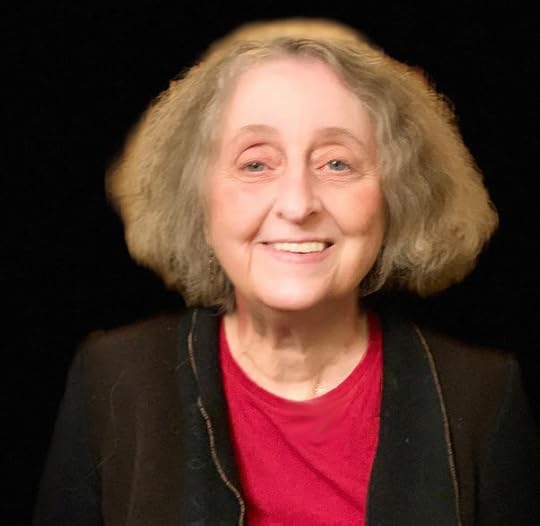
Who in your latest book has surprised you most – and why?
Originally the woman was a minor character, Caroline Church, the daughter of an American living in Paris. But every scene I wrote with Callie stank like dead fish. I couldn’t figure her out. She asks my series detectives to investigate her father’s story. But why would she want to know anything? This is 1912, the era of Jim Crow. She and her father have kept it secret this long. He’s dead. She’ll shut up.
And then I realized Callie was only a mirror, one of those characters that appear in drafts of a story when there’s something unrealized about another character. Get rid of the mirror character and the other character will get more complex.
And I knew who the other character was.
Scariest moment of my life.
When and/or where is your latest book set and is there a story behind that setting?
Yes, and it’s always the same story… Man and woman get on Big Boat. They’re in love, really they are, but they’re fighting. Bang goes the iceberg. “I loved you all along!” she says. “Be brave, little woman,” he says, “I’ll see you in New York.” She goes over the side, he goes into the drink.
(She takes up the entire door, like a cat on a double bed.)
And that’s the end of the story.
It’s a good story, love and redemptive sacrifice. But I could think of a few other things to do with it.
What are you working on now?
I’m marketing Crimes and Survivors with some videos. People love seeing Titanic videos, and I love making them and signal-boosting good ones by other people.
For actual writing, I’m working on a completely different project, set in Brazil during the nineteenth century.
And I have this modern thing involving mediums that I think I’ve finally figured out how to approach…
Which question didn’t I ask you that I should have?
How are you handling bringing out a book in the middle of the coronavirus?
We’re all in this together and we’re yearning to be together. One of the teachers at our local school reads to her students online every day. Caroline Leavitt, Barbara Samuel, and others are sharing videos. The Metropolitan Opera is streaming opera. The citizens of Florence sing to each other from their isolation, and in Wuhan, people bring their food to the balconies of their apartments and share dinner at a distance.
I’m connecting with as many people as I can, especially since my book is about survival. My character Perdita, who’s survived Titanic, wants to be back there, “on the deck of Titanic, with all the lifeboats gone.” There, people would tell the absolute truth to each other, treat each other as fellow humans, say how much they mean to each other. From that comes her lifesaving vision of what survival means: Survival is connection.
As Reisden says at the end of the book, “We are each other’s lifeboats.”
Maybe if that vision of survival reaches only one person who really needs it, I’ve done my job.
(Blatant self-promo: I’ll be posting videos, touring virtually, and bringing out Crimes and Survivors (and all the other eBooks) at $2.99. The first three books in the series are out now. Signed copies of Crimes and Survivors are available for preorder through my local independent, the Brookline Booksmith. More details on www.sarahsmith.com
Sarah Smith’s young adult ghost thriller, The Other Side of Dark, won both the Agatha (for best YA mystery of the year) and the Massachusetts Book Award for best YA book of the year. Her Chasing Shakespeares has been called “the best novel about the Bard since Nothing like the Sun” (Samuel R. Delany) and has been turned into a play. Her Edwardian mysteries starring Alexander von Reisden and Perdita Halley have been published in 14 languages and have reached bestseller status here and abroad. They have been named New York Times Notable Books twice, have received starred reviews
Her book about the Titanic, starring series characters Alexander von Reisden and Perdita Halley, will be published in April 2020.



